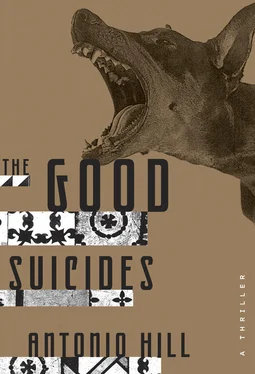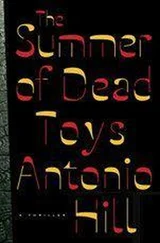Antonio Hill - The Good Suicides
Здесь есть возможность читать онлайн «Antonio Hill - The Good Suicides» весь текст электронной книги совершенно бесплатно (целиком полную версию без сокращений). В некоторых случаях можно слушать аудио, скачать через торрент в формате fb2 и присутствует краткое содержание. Жанр: Триллер, на английском языке. Описание произведения, (предисловие) а так же отзывы посетителей доступны на портале библиотеки ЛибКат.
- Название:The Good Suicides
- Автор:
- Жанр:
- Год:неизвестен
- ISBN:нет данных
- Рейтинг книги:5 / 5. Голосов: 1
-
Избранное:Добавить в избранное
- Отзывы:
-
Ваша оценка:
- 100
- 1
- 2
- 3
- 4
- 5
The Good Suicides: краткое содержание, описание и аннотация
Предлагаем к чтению аннотацию, описание, краткое содержание или предисловие (зависит от того, что написал сам автор книги «The Good Suicides»). Если вы не нашли необходимую информацию о книге — напишите в комментариях, мы постараемся отыскать её.
The Good Suicides — читать онлайн бесплатно полную книгу (весь текст) целиком
Ниже представлен текст книги, разбитый по страницам. Система сохранения места последней прочитанной страницы, позволяет с удобством читать онлайн бесплатно книгу «The Good Suicides», без необходимости каждый раз заново искать на чём Вы остановились. Поставьте закладку, и сможете в любой момент перейти на страницу, на которой закончили чтение.
Интервал:
Закладка:
“I fell asleep here. And what are you doing awake at this time of night?” he counterattacked.
Guillermo shrugged his shoulders without saying anything. As Ruth would have done. As Ruth had done so many times. In an automatic gesture, Héctor searched for a cigarette and lit it. Cigarette butts were spilling out of the ashtray.
“Don’t worry, I won’t fall asleep here again. Go to bed. And don’t forget we’re going out early tomorrow.”
His son nodded. As he watched him walk barefoot toward his room, he thought how hard it was to act as a father without Ruth. Guillermo wasn’t yet fifteen, but at times, looking at his face, you would say he was much older. There was a premature seriousness in his features that pained Héctor more than he cared to admit. He took a long drag on his cigarette and, without knowing why, pressed the button on the remote. He couldn’t even remember what he’d put on that night. With the first few images, that still black-and-white photo of Jean-Paul Belmondo and Jean Seberg, he recognized it and remembered. Breathless . Ruth’s favorite film. He didn’t feel up to watching it again.
Approximately ten hours earlier, Héctor had been contemplating the white walls of the psychologist’s practice, a space he knew well, a tad uncomfortable. As usual, the “kid” was taking his time before beginning the session and Héctor still hadn’t worked out if those minutes of silence served to gauge his state of mind or if the guy was simply a slow starter. In any case, this morning, six months after his first visit, Inspector Salgado wasn’t in the mood to wait. He cleared his throat, crossed and uncrossed his legs, then finally leaned forward and said, “Would you mind if we started?”
“Of course.” And the psychologist raised his eyes from his papers, although he added nothing further.
He remained silent, interrogating the inspector with his gaze. He had an absentminded air that, combined with his youthful features, made you think of one of those child prodigies who solve complex equations at the age of six but at the same time are incapable of kicking a football without falling over. A false impression, Héctor knew. The kid took few shots, certainly; however, when he fired, he was on target. In fact, the therapy sessions, which had begun as a work requirement, had become a routine, weekly at first then fortnightly, that Héctor had followed of his own volition. So that morning he took a deep breath, as he’d learned, before answering.
“Really sorry. The day didn’t start off well.” He leaned back and fixed his eyes on a corner of the office. “And I don’t think it will end any better.”
“Difficulties at home?”
“You don’t have teenagers, do you?” It was an absurd question, given that his listener would have to have been a father at fifteen to have offspring of Guillermo’s age. He remained quiet for a moment to reflect, then, in a tired voice, he went on, “But it’s not that. Guillermo is a good boy. I think the problem is that he was never a problem.”
It was true. And although many fathers would be satisfied by this apparent obedience, Héctor was worried by what he didn’t know; what was going on in his son’s head was a mystery. He never complained, his marks were normal, never excellent but never bad either, and his seriousness could be an example to madder, more irresponsible kids. However, Héctor noticed-or rather he sensed-that there was something sad behind this absolute normality. Guillermo had always been a happy child and now, in mid-adolescence, he’d become an introverted boy whose life, when he wasn’t at school, basically passed by within the four walls of his bedroom. He spoke very little. He didn’t have many friends. All in all, thought Héctor, he’s not so different from me.
“And you, Inspector? How are you? Still not sleeping?”
Héctor hesitated before admitting it. It was a subject on which they couldn’t agree. After months of insomnia, the psychologist had recommended some gentle sleeping pills, which Héctor refused to take. Partly because he didn’t want to become accustomed to them; partly because it was in the early hours that his mind worked at full capacity and he didn’t want to dispense with his most productive hours; partly because sleeping plunged him onto uncertain and not always pleasant ground.
The kid deduced the reasons for his silence.
“You’re wearing yourself out uselessly, Héctor. And, without wanting to, you’re wearing out the people around you.”
The inspector raised his head. He rarely addressed him so directly. The kid held his gaze without turning a hair.
“You know I’m right. When you started to come to the practice we were dealing with a very different subject. A subject that was put aside after what happened to your ex-wife.” He spoke in a firm voice, without hesitation. “I understand that the situation is difficult, but becoming obsessed won’t get you anywhere.”
“You think I’m obsessed?”
“Aren’t you?”
Héctor gave a faint, bitter smile.
“And what do you suggest? That I forget Ruth? That I accept that we’ll never know the truth?”
“You don’t need to accept it. Just live with it without rebelling against the world every day. Listen to me while I ask you as the police officer you are: how many cases remain unsolved for a time? How many are cleared up years later?”
“You don’t understand,” Héctor replied, and took a few seconds to continue speaking. “Sometimes … sometimes I manage to forget it all, for a few hours, while I work or when I go out running, then it comes back. Suddenly. Like a ghost. Expectant. It’s not an unpleasant sensation, not accusing or asking, but it’s there. And it doesn’t go away easily.”
“What is it that’s there?” The question had been formulated in the same neutral tone that marked all the young therapist’s interjections, although Héctor noticed, or perhaps feared, that he was picking up a particular nuance.
“Relax.” He smiled. “It’s not that sometimes I see dead people. It’s just the feeling that …” He paused to find the words. “When you have lived with someone for a long time, there are times that you just know they’re at home. You wake up from a siesta and you sense that the other person is there, without needing to see them. You understand? That wasn’t happening to me anymore. I mean, it never happened during the time I was separated from Ruth. Only after her … disappearance.”
There was a pause. The psychologist scribbled something in that notebook to which Héctor had no visual access. At times he thought that those notes formed part of the theatrical ritual of a session: symbols which served only to make the interlocutor-that is, him-feel listened to. He was going to put forward his theory out loud when the other man began to speak; he spoke slowly, amiably, almost carefully.
“You know something, Inspector?” he asked. “This is the first time you have admitted, even in a roundabout way, that Ruth might be dead.”
“We Argentines are well aware what ‘disappeared’ can mean,” replied Héctor. “Don’t forget that.” He cleared his throat. “Even so, we have no objective proof that Ruth is dead. But-”
“But you believe it’s so, right?”
Héctor looked over his shoulder, as if he were afraid someone might hear. “That’s what fucks me over most.” He had lowered his voice, speaking more to himself. “You can’t even mourn her because you feel like a fucking traitor who threw in the towel too early.” He took a deep breath. “I beg your pardon. Christmas has never agreed with me. I thought I’d have come further with this, but … I had to give in. There’s nothing. I’ve found nothing. Damn it, it’s as if someone erased her from a drawing without a trace.”
Читать дальшеИнтервал:
Закладка:
Похожие книги на «The Good Suicides»
Представляем Вашему вниманию похожие книги на «The Good Suicides» списком для выбора. Мы отобрали схожую по названию и смыслу литературу в надежде предоставить читателям больше вариантов отыскать новые, интересные, ещё непрочитанные произведения.
Обсуждение, отзывы о книге «The Good Suicides» и просто собственные мнения читателей. Оставьте ваши комментарии, напишите, что Вы думаете о произведении, его смысле или главных героях. Укажите что конкретно понравилось, а что нет, и почему Вы так считаете.












